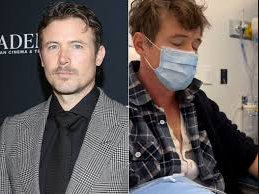Penn Badgley Faced Body Dysmorphia as a Child
Penn Badgley, best known for his roles in Gossip Girl and You, has openly shared his early struggles with body image. From a young age, Badgley experienced feelings of insecurity that deeply influenced how he viewed himself and his body.
As a child, Badgley began to suffer from body dysmorphia. This mental health condition caused him to obsess over perceived flaws in his appearance, often seeing imperfections that others did not notice. These intrusive thoughts consumed much of his time and energy, leading to a constant cycle of self-criticism and doubt. He admitted that these feelings often overwhelmed him, making it difficult to feel confident or comfortable in his own skin.
Badgley has explained that growing up in the entertainment industry only added to these challenges. As a young actor, he faced intense pressure from auditions and industry standards. The need to fit into certain roles and meet unrealistic expectations made him even more critical of his appearance. During his teenage years, he struggled greatly with accepting his body. He described how the spotlight made it hard to escape these insecurities and often left him feeling inadequate.

Despite these difficulties, Badgley eventually began to focus on building a healthier relationship with his body and mind. He worked to challenge his negative thoughts and practice self-care. By prioritizing mental health and surrounding himself with supportive people, he was able to make gradual progress. Badgley emphasized the importance of patience and persistence in this journey, acknowledging that recovery from body dysmorphia is rarely quick or easy.

Today, Badgley uses his platform to speak openly about his experiences. He hopes to encourage others who may be facing similar struggles with body image and mental health. By sharing his story, he aims to reduce the stigma surrounding these issues and remind people that they are not alone. He believes it is important to seek help and to talk about mental health challenges without fear or shame.
Badgley’s journey highlights the need for early awareness and intervention in cases of body dysmorphia. It also shows that with the right support and self-compassion, healing is possible. His openness serves as a reminder that even those in the public eye are not immune to struggles with self-image. His message resonates with many who face similar battles, offering hope and inspiration to move forward.







